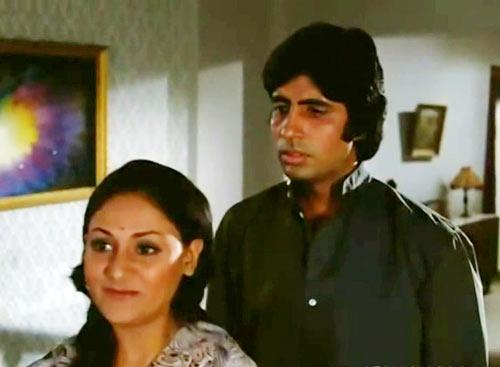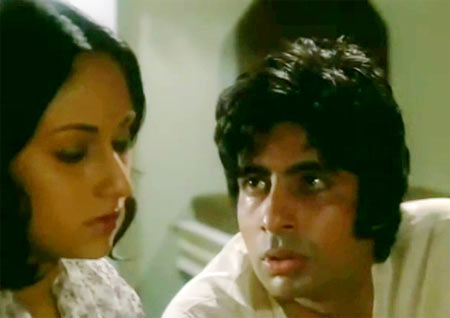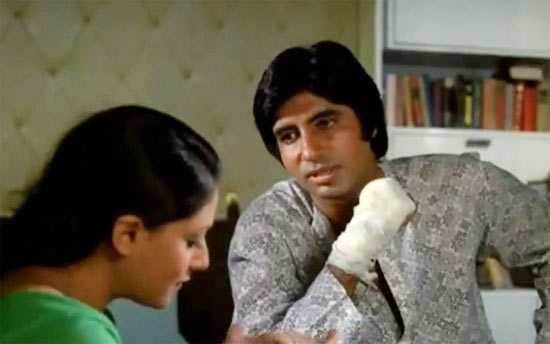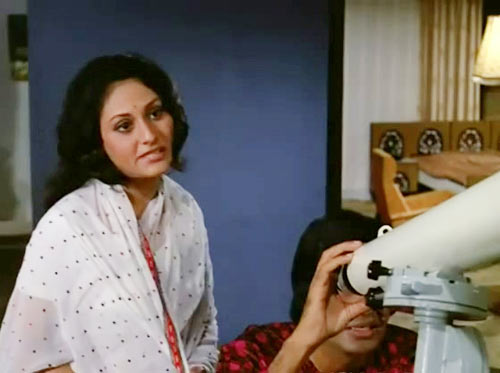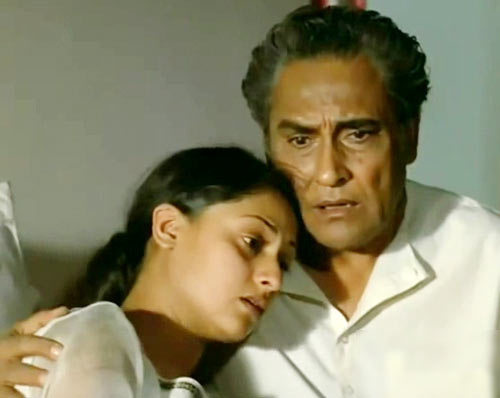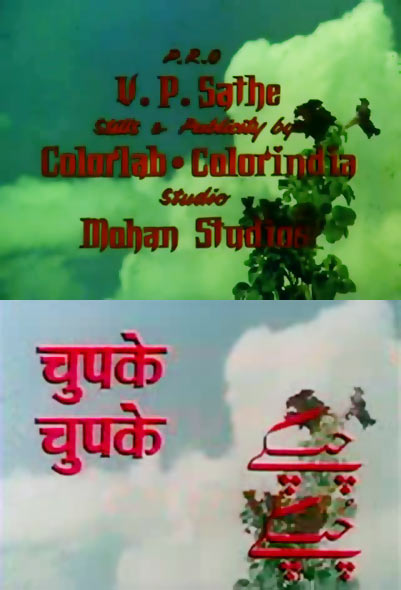 | « Back to article | Print this article |
Classics revisited: The spirit of Mili lives on
In our special series re-visiting great Hindi film classics, we look back at Amitabh and Jaya Bachchan-starrer Mili (1975).
When you view life as you know it through familiar surroundings and your own values, the experience of a film transcends the screen and becomes one with your being. Hrishikesh Mukherjee's Mili is one of them.
Truth is so are all his films.
The disarming simplicity and sweet idealism of the society he portrayed -- middle-class, with a good measure of wit and sentiment thrown in, continues to be the most comforting aspect of viewing a Hrishida film. In an interview to rediff.com once, he expounds, 'Life is so short. There is so little time, to love, to make friends. I find there is no point in making a film where you show that love is degenerating, or a friendship is breaking.'
It's not as if his films were seeing life through rose-tinted glasses. On the contrary, they reflected good-naturedly on the petty mindsets that lead to needless complications in an individual's life. There were no scowling bad guys in his movies. Conflict was generated through circumstances of fate or folly. And so, terminal illness plays the miscreant in both Anand and Mili, which contemplate upon the inevitability of death through its 'full of life' protagonists.
While Anand finds its mention repeatedly (and rightly) among the bests of Hindi cinema, Mili is unfairly dismissed as its recycled sibling. Though similar in theme -- titular characters, good-hearted, diagnosed with terminal illiness -- Mili has its own unique tone and attributes.
Classics revisited: The spirit of Mili lives on
I have a soft corner for this Amitabh Bachchan-Jaya Bhaduri (still credited by her original surname in Mili) starrer but even if I put aside this fondness, here's the thing. Anand is an extraordinary man with an inspiring, poetic outlook. He's charismatic, expressive and makes a long-lasting impression on anyone who comes in contact.
Mili or M.I.L.I (she emphasises as if reminding you of the difference) is a chipper college student, a child-woman who stills hangs out with her colony kids. She has a known support system -- a loving family. She's friendly but mildly spoilt and can give an earful if need be. She's talkative but not philosophical. Like most girls of her age, she's a regular, happy-go-lucky romantic.
The idea of Mili came about after Hrishida heard, 'a short story about this girl who suffered a kind of anaemia. And she is going to die as a result. But she falls in love and wants to live too.'
When it came out, in 1975, Hindi cinema's beloved Guddi was already married to AB and had given birth to their daughter, Shweta but the 27-year-old is effortlessly believable as the college-going prankster bantering with her doting daddy (Ashok Kumar), caring aunt (Usha Kiron) and Vir Chakra recipient army-man brother (Suresh Chatwal).
Classics revisited: The spirit of Mili lives on
Mili is narrated in a flashback with a lone Ashok Kumar standing on the terrace, watching a plane take off, insinuating the grim future of the story. But the distress prompted by his disclosure is quickly forgotten amidst the frolic that follows.
Life in Bandra's Sea View residential complex is moving against reliable routine -- usual activities of restless kids, curious housewives and their afternoon meet-ups. The latter led by gossipmonger Shubha Khote whilst juggling as matchmaker for her overzealous sister-in-law. She's the sort of nuisance that would probably find a best friend in Mrs Bennet.
Mili's other neighbour and society secretary happens to be the progressive, defiant Runa (Aruna Irani). Her introductory conversation with Mili's brother hints at a romantic past, which was buried for the sake of wealthy prospects and gender games.
While never directing influencing the chief story, the objective of Hrishida's multi-character narrative is primarily to build an ambiance and to lend it range.
After establishing the various colours that envelope Mili, he introduces a dark hue in the form of Amitabh Bachchan's Shekhar -- the unfortunate inheritor of his family's riches and infamy -- Main darne ki cheez hoon kyunki main apne maata-pitaah ka beta hoon aur bhoot bhi. Sparks, however, don't immediately fly when this gloomy new occupant of the terrace flat meets the angel-down-the-floor.
What ensues, in fact, is a war of words between adorability and intensity. Somewhat like Oscar Wilde's short story, The Selfish Giant, he first resists the kids playing on his terrain, but slowly warms up to them (Agar aap daadhi nahi banayenge toh bhi hum aapko pappi denge).
Classics revisited: The spirit of Mili lives on
Though constantly drinking -- beer during the day, whisky in the night -- Shekhar's offensive demeanour is a typical defence mechanism to guard himself from the barbs about his haunting past. His anguish is heartbreaking and Mili's sympathetic heart embraces him without question.
Long before Shrek and Donkey discovered stories within stars, Shekhar and Mili bond over constellations with the telescope acting as both -- a witness and a medium of their blooming romance. (By the way, Jupiter now has 67 moons. The count was 11 till Mili.) They also read each other's palms to indirectly convey their impressions about one another -- Yeh line of heart hai. Tumhara dil bahut bada hai aur aaine ki tarah saaf.
Just as Shekhar springs back to life after a prolonged state of darkness, Mili's brightness begins to fade as her health deteriorates. Her radiance is jaded but she is determined and looks forward to the letter exchanges accompanying Shekhar's vibrant bouquets. 'Jaldi achi ho jao, Dusht Rakshas.' 'Main buri kab thi jo achhi ho jaon?'
Though the dead flowers pile up on the bureau and horrifying nightmares pervade her vulnerable psyche, Mili's spirit tenderly clings to hope.
There's a beautiful scene with her father. She eavesdropped about her irreversible condition on the telephone extension and doesn't want to state the obvious. Overwhelmed and terrified, she clasps around him, expecting an assurance only a parent can provide and gets it too; it's such a relatable moment, impossible not to wail along. Hrishida was a master of connect.
Classics revisited: The spirit of Mili lives on
Mukerjee's casting has always been one of his greatest strengths. So is his gift to bring out the innate quirks and goodness of his actors, making all his creations from Satyakam, Anupama, Anand, Babumoshai, Memdidi, Guddi, Parimal, Sukumar, Jeejaji, Bhavani Shankar, Ramprasad Dashrathprasad Sharma, Raghu, Manju and Mili so loveable and worth rooting for.
Jaya Bhaduri's real-life rapport with Hrishida, under whom she became Guddi, translates to big screen warmth. The duo shared father-daughter camaraderie and it reflects in her spontaneous smiles and sulk every time she faces the camera and Hrishida behind it.
Her Mili is a sensible extension of Guddi. Unlike actors who tend to go overboard manipulating the heart strings, the actress is never once showy, not even in the cry-out-loud moments.
Though nominated for her acclaimed performance by Filmfare (she lost out to Lakshmi for Julie), the Mili star herself is not a big fan of her work in it. In an old interview to rediff, she gets candid, 'When I see Mili today, I feel terrible. I could have done it so much better. Amit, who had a less important role, was excellent.'
It may not be the central part but Amitabh Bachchan's depiction of a brooding, wounded, mostly inebriated brute and his gradual transformation into a kind, soft-spoken giver ranks among my personal favourites. It may not be of any particular significance but I adored his wardrobe of mostly silk kurtas in the film. (I certainly plan to include it in my sequel to the museum of Hindi film souvenirs story.
The chemistry between the husband and wife crackles. Like the time when she chides him with her amusing logic or he gently comforts his 'hasmukh dost' with a voice dipped in affection, the tender facets of a man and woman relationship, when they're much more than lovers -- friends, parents -- is clearly visible.
It's also nice to see Aruna Irani play a woman of substance than the usual fluff she was associated with back then. Like he did with Bindu in Abhimaan, Hrishida deconstructed set images to prove there's more than meets the eye. He employs Irani's fire to assert someone who cannot be dismissed easily -- Main khud bhi khaasi budthameez hoon -- who designs her own attire; one of her outfits is named Provocation. In any other hands, this could easily border on corny but under Hrishi-da's direction, it's sassy and triumphant
Classics revisited: The spirit of Mili lives on
Being an editor helps too, he never stretches any mood -- comic or melodramatic -- beyond necessity. Every scene seamlessly flows from one to another with purpose and precision.
When Mili's father politely disapproves of Shekhar's closeness to his daughter, he's awkward never dramatic. Hence, when he acknowledges within seconds the earnestness of her suitor, the change in demeanour is subtle and persuasive (Tum toh chandan ka ped ho beta. Lekin chandan sirf chittah mein jalne ke liye nahi hota chahe woh Mili ki chittah hi kyon na ho). Of course, it's enacted by Ashok Kumar, the natural legend, so how else can it be?
There are only three songs in Mili. Composer Sachin Dev Burman had a stroke while recording the song Badi sooni sooni with Kishore Kumar and went into coma. He passed away in October that year.
His wife, son and assistant -- Mrs Meera, Rahul and Ashish Babloo came together to complete the soundtrack boasting of timeless melodies like Aaye tum yaad mujhe, Badi sooni sooni hai and Maine kaha phoolon se marked by Yogesh's soul-stirring penmanship ( Kabhi main na soya, kahin mujh se khoya sukh mera aise. Pataa naam likhkar, kahin yunhi rakhkar, bhoole koi jaise.)
Classics revisited: The spirit of Mili lives on
Speaking of writing, Mili, developed from Bimal Dutta's story and screenplay, displays some truly fine writing by Dr Rahi Masoom Raza. The latter (Mili, Golmaal, Naram Garam, Jurmana) alternated with Gulzar (Guddi, Anand, Bawaarchi, Namak Haraam, Chupke Chupke, Khubsoorat) to write the memorable lines of Hrishida's offerings.
One of its many gems besides the ones I have mentioned throughout the story -- Dosti achi ya buri nahi hoti. Dost ache ya bure hote hain, reveal Raza's cleverness in articulating the profound in plain.
Some interesting points I noticed while watching the film, which was loosely remade as Love with Salman Khan and Revathy, for the umpteenth time: The opening credits of Mili and the beloved comedy, Chupke Chupke, which released within a gap of few months, are often identical with its line-up of flora specimens.
Terrace has played a recurring venue in many of Hrishi-da's important scenes and songs. Apart from Mili, think Tera mera pyaar amar (Asli Naqli), Piya baawri, Saare niyam to do (Khubsoorat), Chupke chupke chali ri purwaiya (Chupke Chupke), Ek baat kahoon gar maano (Golmaal).
In both Mili and Anand, Amitabh Bachchan is looked after of by an elderly domestic help – Gopi/Raghu Kaka respectively since he was a child.
Jaya Bhaduri wore similar bell-sleeved blouses and skirts, preferably in white, in both Chupke Chupke and Mili apart from printed outfits and saris typical to the 1970s.
Asrani, who featured in most Hrishi-da movies, makes a guest appearance as an accidental gate-crasher in Mili's impromptu homecoming party for her brother.
But the party called Mili ends on a sombre note with her taking off to Switzerland for specialised treatment. Even if her father doesn't seem too hopeful and bids her a tearful goodbye from the terrace, I continue to believe she was cured and lived her happily-ever-after with Shekhar. The stars were always in their favour.

